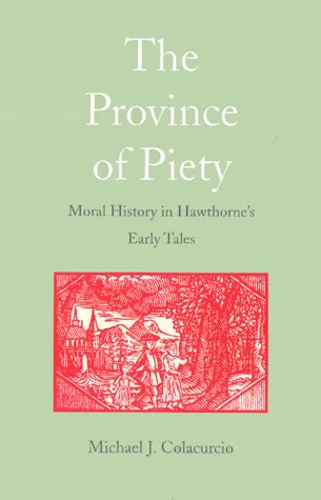The Province Of Piety. Moral History In Hawthorne'S Early Tales
Par :Formats :
- Paiement en ligne :
- Livraison à domicile ou en point Mondial Relay estimée à partir du 5 décembreCet article sera commandé chez un fournisseur et vous sera envoyé 10 jours après la date de votre commande.
- Retrait Click and Collect en magasin gratuit
- Livraison à domicile ou en point Mondial Relay estimée à partir du 5 décembre
- Nombre de pages670
- PrésentationBroché
- Poids1.03 kg
- Dimensions15,4 cm × 23,5 cm × 3,5 cm
- ISBN0-8223-1572-6
- EAN9780822315728
- Date de parution31/08/2000
- ÉditeurDuke University Press
Résumé
In this celebrated analysis of Nathaniel Hawthorne, Michael J. Colacurcio presents a view of the author as America's first significant intellectual historian. Colacurcio shows that Hawthorne's fiction responds to a wide range of sermons, pamphlets, and religious tracts and debates-a variety of moral discourses at large in the world of provincial New England.
Informed by comprehensive historical research, the author reveals that Hawthorne was steeped in New England historiography, particularly the sermon literature of the seventeenth century. But, as Colacurcio makes clear, Hawthorne did not merely borrow from the historical texts he deliberately studied; rather, he is best understood as having written history. In The Province of Piety, Hawthorne is seen as a moral historian working with fictional narratives-a writer brilliantly involved in examining the moral and political effects of Puritanism in America and recreating the emotional and cultural contexts in which earlier Americans had lived.
In this celebrated analysis of Nathaniel Hawthorne, Michael J. Colacurcio presents a view of the author as America's first significant intellectual historian. Colacurcio shows that Hawthorne's fiction responds to a wide range of sermons, pamphlets, and religious tracts and debates-a variety of moral discourses at large in the world of provincial New England.
Informed by comprehensive historical research, the author reveals that Hawthorne was steeped in New England historiography, particularly the sermon literature of the seventeenth century. But, as Colacurcio makes clear, Hawthorne did not merely borrow from the historical texts he deliberately studied; rather, he is best understood as having written history. In The Province of Piety, Hawthorne is seen as a moral historian working with fictional narratives-a writer brilliantly involved in examining the moral and political effects of Puritanism in America and recreating the emotional and cultural contexts in which earlier Americans had lived.


